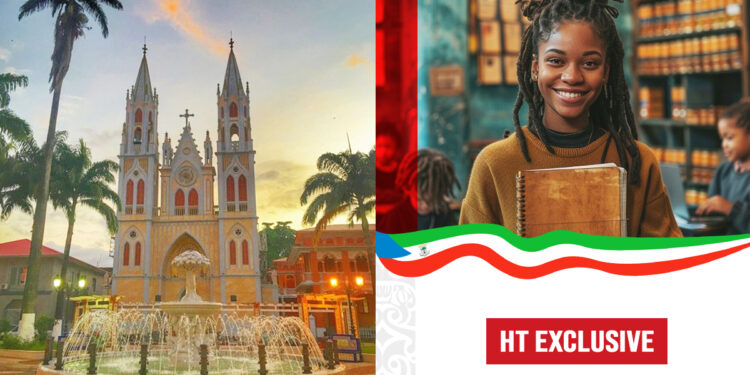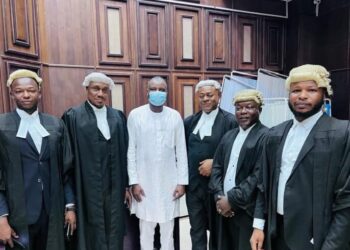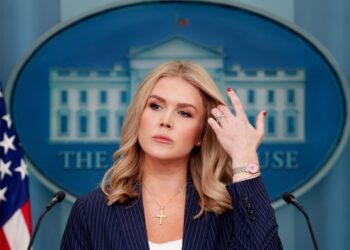By Emmanuel Nduka
Away from the alleged sexual exploits of Baltasar Ebang Engonga, Equatorial Guinea’s former head of the National Agency for Financial Investigation (ANIF), the small Central African country with a population of around 1.9 million people has made commendable accomplishments in reaping from its vast oil wealth, investing in education, and sustaining socio-political stability over the years.
But the optics for which the oil-rich nation came under the spotlight recently was not very good.
Long story made short, during investigation amid allegations of corruption and misconduct, Engonga’s personal bad habits were revealed. As seen in his official computer by investigating authorities, Engonga was alleged to have explicit videos of himself and at least 400 women, many of whom are linked to high-profile individuals in the country.
This is not the stellar reputation that Equatorial Guinea represents.
According to statistics from UNESCO Institute for Statistics (UIS), Equatorial Guinea has one of the highest literacy rates in Africa as of this year. With a 95-96% literacy rate, the oil-rich nation is only second to Seychelles (98%). Zimbabwe (90-92%), Mauritius (90%), and South Africa (87-90%) complete the top 5. Tunisia, Botswana, Libya, Gabon and Algeria make up the top 10.
With a 62-65% literacy rate, Nigeria sadly does not come out tops when compared with other African countries with much more robust education systems.
How did Equatorial Guinea get there?
Equatorial Guinea’s remarkable progress in improving its literacy rate to come out tops in Africa is the result of a combination of factors; the key driver being huge investments in education, particularly in the capital, Malabo, and other urban areas. However, challenges remain in rural regions.
Revenues from Equatorial Guinea’s significant oil reserves, discovered in the 1990s, have substantially increased government spending abilities. The resulting economic boom allowed the government to allocate more funds toward public services, including education. The wealth generated from oil exports allowed for investment in modernizing the country’s infrastructure. This included building new schools, improving existing educational facilities, recruitment of qualified teachers, and enhancing access to educational resources, which directly translates to higher literacy rates.
The country offers free and compulsory education up to the secondary level for all. In recent years, authorities in Equatorial Guinea has made education a key priority. The free and compulsory education for all policy was designed to eliminate financial barriers to education, ensuring that all children have the opportunity to attend school and learn.
Led by 82-year-old President Teodoro Obiang Nguema, Equatorial Guinea has incorporated education as a key pillar of its national development plans. For example, the Vision 2020 championed by Nguema, and subsequent national development strategies have greatly championed the improvement of education. This strategic focus on human capital development has helped increase literacy and educational accomplishment of the country.
In an increasingly interconnected world, no country can afford to isolate itself from global opportunities. Equatorial Guinea has largely leveraged on strategic international partnerships. The country has worked with international organizations such as UNESCO, the World Bank, and the African Development Bank to receive technical support and implement educational reforms. These partnerships have greatly helped improve curriculum standards, teacher training, and overall educational management.
There is more. President’s Nguema’s consistent leadership of 43 years (the longest serving leader in Africa) has paved way for political stability. Since independence in 1968, Equatorial Guinea has had a relatively stable government, although it has been criticized for its lack of political freedoms and human rights issues. This stability has allowed for the implementation of long-term policies, including those related to education.
As a key driver, huge investments has been deployed in teacher training and recruitment to ensure that the educational system meets international standards. Teacher training programs have been implemented to improve teaching quality at all levels of schooling. At some point, the government had also recruited teachers from other countries to fill gaps and raise the overall standard of education. As per curriculum development, focus has been placed on improvement both in terms of the subjects taught and the methods used. English and Spanish are taught alongside the indigenous languages, which helps integrate the population and increase educational opportunities.
To address the challenges of rural education that still persists, substantial efforts has been made to bring education to rural areas. The government’s investment in infrastructure has extended to rural and remote areas, where new schools have been built, and educational services have been made more accessible. These efforts have helped reduce regional disparities and promote national literacy.
Nguema has always been bullish about education as a pillar for development. Speaking at a World Education Forum held in Dakar, Senegal some years ago, Nguema posited that: “Education is the basis for the development of any country. We must work together to ensure that all citizens have access to education, as it is fundamental for the progress of any nation”.
“In the past years, we have allocated substantial resources to the education sector, building schools and training teachers, to ensure that our youth are prepared to face the challenges of a modern world. Our vision for Equatorial Guinea’s future includes a population that is well-educated, skilled and capable of leading the country into a new era of development. Only through education can we achieve this”.
Community engagement, regional collaboration, strong family support and values for education have spurred Equatorial Guinea to educational excellence.
Nigeria’s Support for Equatorial in the Past
Africa’s icon of peace and former Nigerian President, Goodluck Jonathan did extend financial assistance to Equatorial Guinea in 2012, which helped the country meet various fiscal obligations, including paying civil servants’ salaries. This assistance was part of a broader bilateral relationship between the two nations, particularly during times when Equatorial Guinea faced economic challenges despite its oil wealth.
Equatorial Guinea had struggled with financial management, and at certain points, the government faced difficulties in balancing the national budget, especially when oil prices were volatile. Nigeria’s support under Jonathan helped address immediate fiscal shortfalls.
In addition to direct financial support, the Nigerian government also entered into economic cooperation agreements that included aid packages and financial credit lines. These agreements were designed to help Equatorial Guinea maintain economic stability and continue its development efforts, including ensuring that the public sector, including civil servants, was paid on time. The support from Nigeria was not just limited to short-term loans but also included broader trade and investment partnerships, particularly in the oil and gas sectors. Nigeria, as Africa’s largest oil producer, had a vested interest in strengthening ties with Equatorial Guinea, which also had a growing oil industry.
Nigeria and Equatorial Guinea formed strong ties in the oil and gas sector, and both countries mutually benefited from this relationship. While Nigeria has shared expertise, technology, and investment in Equatorial Guinea’s oil industry, assisting Equatorial Guinea with its financial difficulties also benefited Nigeria’s interests in the region. This was as former president Jonathan’s foreign policy was branded by a commitment to pan-Africanism and regional cooperation, and providing support to African countries including Equatorial Guinea to drive development and self-reliance.




































